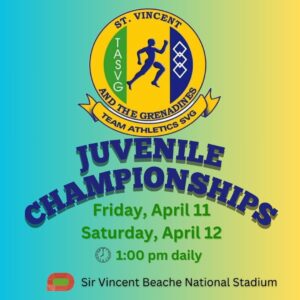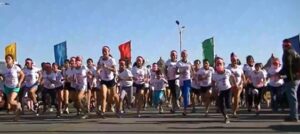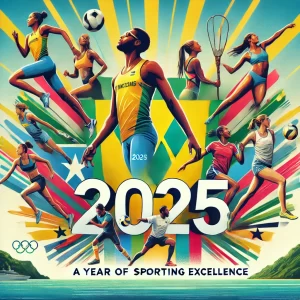Latest challenges to the International Sport Plantation
In my weekly Column dated 14 May 2021, I wrote, “Nelson Mandela did declare that sport has the power to change the world. But more than a century before him, de Coubertin, followed on the works of the likes of William ‘Penny’ Brookes and others, committing themselves and the institutions they spawned to the cause celebre espoused by sport.
Today, even as people are dying from the pandemic, mankind, almost everywhere, has regressed into the dark recesses of decadence where valuing one another on the basis of colour is commonplace.”
Ongoing developments in sport have only strengthened the position adopted in the aforementioned Column. What we are seeing today is a seeming increased shift on what we choose to label the International Sport Plantation (ISP), led by the International Olympic Committee (IOC). An important, perennial question remains, ‘who so empowered the ISP; who gave them that right?’
There seems to be mounting evidence that suggests the IOC has allowed itself to act on the basis of some unfounded ‘sense of entitlement’ that allows its leadership to speak and act as though they have some sort of ‘divinely inspired’ right to speak on behalf of sport, without necessarily engaging their own stakeholders in the discourse. In fact, there may not even be a sense that the stakeholders of the Movement have any right to be engaged beyond mere acquiescence to the dictates dispensed as in the period of conquest and colonization by the very European powers that today control the institution itself, as has been the case since its establishment in 1894.
The case of Peng Shuai
The current situation where the professional organization, the Women’s Tennis Association (WTA) has taken a stance in respect of one of their professional players, Peng Shuai. A New York Times article by Christopher Cleary, dated 14 November 2021, stated, “Steve Simon, the chief executive of the WTA Tour, called on Sunday for Chinese authorities to investigate allegations of sexual assault made by the Chinese women’s tennis star Peng Shuai against Zhang Gaoli, a former vice premier of China.”
Simon essentially threw down the gauntlet to the Chinese authorities, leveraging the fact that the Chinese would have benefitted from being on the WTA circuit. He suggested that he and the WTA were prepared to take that away from the Chinese if the matter of Peng Shuai is not appropriately settled.
We need to bear in mind that here is an international professional sport organization daring to stand toe-to-toe with the rapidly growing Chinese authorities over an athlete.
But Simon insisted on the challenge, stating, “Obviously she displayed tremendous courage going public…Now we want to make sure we’re moving forward to a place where a full and transparent investigation is conducted. Anything else, I think, is an affront to not only our players but to all women.”
By raising the issue of women’s rights, Simon hit a poignant note; one that he knew would resonate with the international community, especially women’s groups and international agencies that have been promoting the cause of women.
In the world of sport, women have been disrespected, abused, calumniated and tokenized, all as their male counterparts have fashioned one institution after another, in their own image and likeness.
Cleary quotes Simon as stating, “If at the end of the day, we don’t see the appropriate results from this, we would be prepared to take that step and not operate our business in China if that’s what it came to.”
While some of the international sports leaders were silent, for one reason or another, several important international sport figures came to the fore, seeking answers; seeking the truth, about Peng Shuai’s situation, including here precise whereabouts.
CNN carried a report on 18 November that cited a comment from Japanese Tennis icon, Naomi Osaka that stated, “Censorship is never OK at any cost, I hope Peng Shuai and her family are safe and OK. I’m in shock of the current situation and I’m sending love and light her way.”
Also making comments on the case were the legendary Billy Jean King and Chris Evert. In the case of King, the CNN report stated, “Hoping that Peng Shuai is found safe and that her accusations are fully investigated,” while Evert was quoted, “these accusations are very disturbing…I’ve known Peng since she was 14; we should all be concerned; this is serious; where is she? Is she safe? Any information would be appreciated.”
Novak Djokovic also added his voice and commended the WTA on its stance on the matter.
Interestingly, among those calling for some evidence of Peng Shuai’s true status and well-being, were the Australian and US governments, both of whom started sending signals of their possible diplomatic boycott. For the US however, the rationale for the diplomatic boycott includes what White House press secretary, Jen Psaki, is quoted by Andrew Reid (of Yahoo Sport Australia) in his piece on 6 December, as saying in a press briefing recently, “US diplomatic or official representation would treat these games as business as usual in the face of the PRC’s egregious human rights abuses and atrocities in Xinjiang, and we simply can’t do that.”
Human rights groups have long been calling for some sort of action from the IOC and indeed, international sports federations, to adopt a firm stance on countries whose local conduct appears to flout the very principles that they have long been promoting as integral to sport and its impact on the human condition. Much of the protestations have fallen on the deaf ears of the international sports federations.
Diplomacy or Hypocrisy?
Cleary’s piece in the New York Times had a rather interesting comment from another Tennis icon. He quoted a tweet from Martina Navratilova as noting that the WTA adopted what she referred to as a “brave stance”. She dared to ask, “Now – what say you, IOC?” She added, “IOC – so far I can barely hear you!!!”
Indeed, it took some time before the IOC issued a statement and when it did, it was about having had an opportunity to engage in a telephone conversation with Peng Shuai. But the international community was unimpressed.
This Columnist asks whether it was the US’ hint of a diplomatic boycott that cajoled the IOC into some sort of action. It may well be that with the Winter Olympics scheduled to begin in Beijing, China, in a few weeks, and the potential losses that can be incurred should a boycott take place, is enough to force the IOC to ‘wake up and smell the coffee’.
Mounting pressure from several sources have also signalled that the IOC may not be as influential as it perceived itself to be. The challenges in respect of a call for more concrete evidence of Peng’s true status continue and this may have forced the second IOC’s call and its attempt at telling the world that they are satisfied that all is well.
The IOC, seemingly attempting to serve up insignificant palliatives to the international community in the face of increasing criticism, has failed to find answers as to why Peng Shuai was suddenly silent after her ‘brave’ accusation. Was she silenced by the authorities?
Has she been threatened?
Importantly, even as the IOC circulated a statement on Tuesday 7 December 2021, in rather interesting but something of a lame cop-out rather than address the reality of the situation.
The statement reads in part, “The presence of government officials and diplomats is a purely political decision for each government, which the IOC in its political neutrality fully respects. At the same time, this announcement also makes it clear that the Olympic Games and the participation of the athletes are beyond politics and we welcome this.
The support for the athletes and the Olympic Games has been expressed multiple times in the recent months, most recently by the United Nations resolution entitled “Building a peaceful and better world through sport and the Olympic ideal”, adopted by consensus of all 193 Member States and co-sponsored by 173 Member States at the 76th Session of the United Nations General Assembly in New York just last week.
It calls for the observance of the Olympic Truce for the Olympic and Paralympic Games Beijing 2022, from seven days before the start of the Olympic Games, on 4 February 2022, until seven days after the end of the Paralympic Games.
The resolution also “calls upon all Member States to cooperate with the International Olympic Committee and the International Paralympic Committee in their efforts to use sport as a tool to promote peace, dialogue and reconciliation in areas of conflict during and beyond the period of the Olympic and Paralympic Games”.
The fact is that it may well prove difficult for the very IOC to identify a period over the years of its existence when the global community strictly adhered to the Olympic Truce such that there was global peace as a direct result.
Unfortunately for the IOC, there is now an important confrontation with the international community that includes the sport fraternity. The organization is now compelled to come to terms with its own existence in the broader lobal society. It has to confront its own insistence on Olympism as a way of life that is not restricted to competition on the field of play and reveal how the values attendant to the noble concept must relate to the human condition.
Essentially, therefore, the IOC must determine whether its concept of Olympism, its insistence on gender equality and fair play, extends to confrontation with the leadership of a powerful nation ‘for the cause’ or be exposed as a sham that allows the organization to parade, hypocritically, satisfying itself and its adherents that it is indeed the leader of the International Sports Plantation and not genuinely interested in humanity.
For the IOC, all that it claims that it stands for over the past 127 years, is at stake. The world watches, waiting for an outcome that will inevitably determine the image of the IOC in the eyes of the world.
The IOC has never considered this reality.
This is not the situation of the boycotts of 1976, 1980 and 1984. This is of a different time and the players now include athletes who have come of age and women who have graduated from the era of women’s liberation to a “Me Too” movement that is immensely ore powerful and focused.
The international fraternity, especially those involved in sport must judge for themselves whether the IOC has ever really been non-political even as it appeals for sport to be devoid of politics. They must dispassionately critically analyse the origins, structure and operations of the IOC, through history, to determine the extent to which it has attained a point where they must call into question the validity of an institution that is as self-perpetuating at it is as it stands above yet in charge of the geo-politics of international sport, abrogating unto itself the role of leader of the International Sport Plantation, a creature of its own making.






